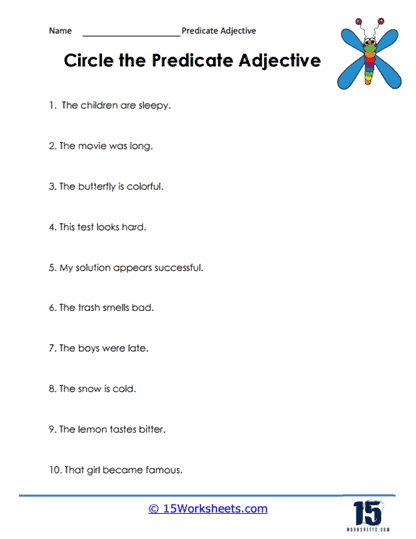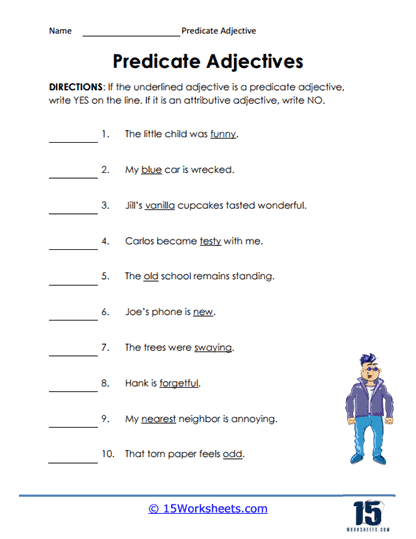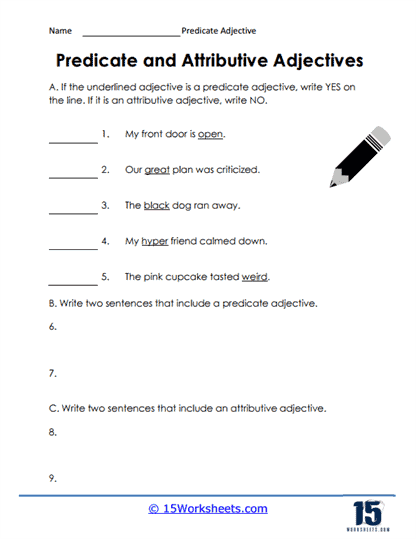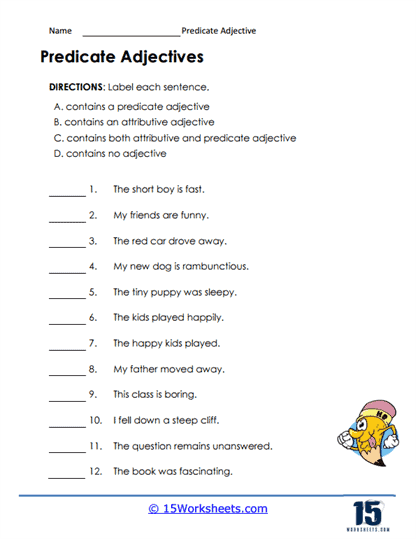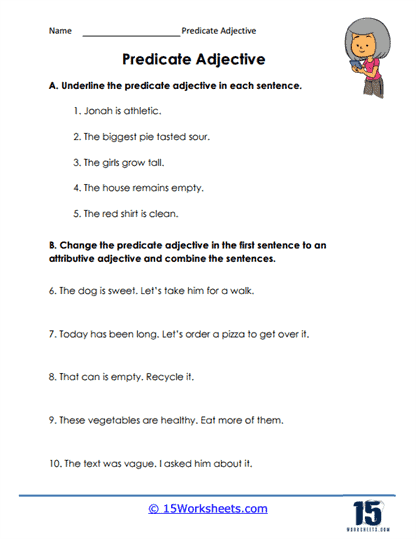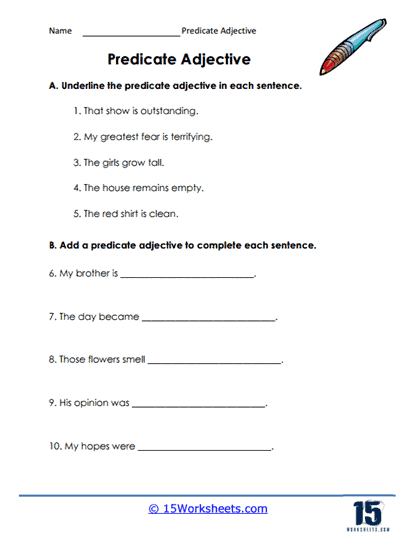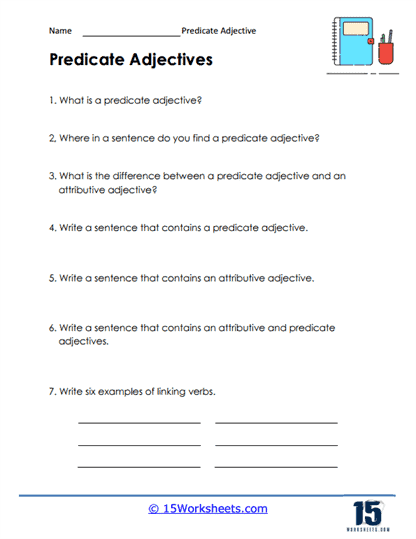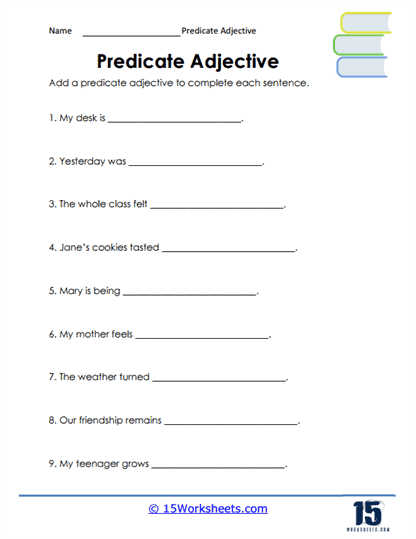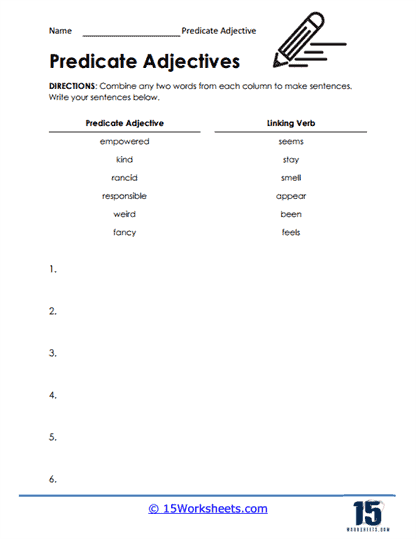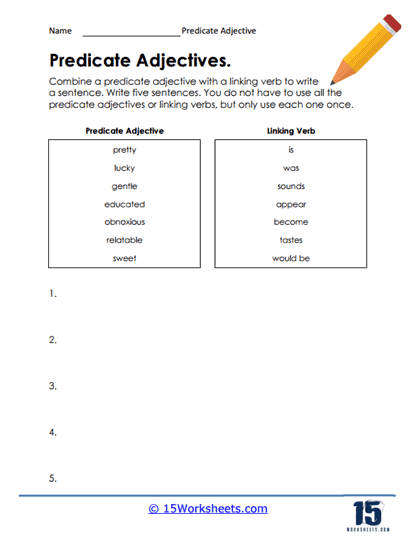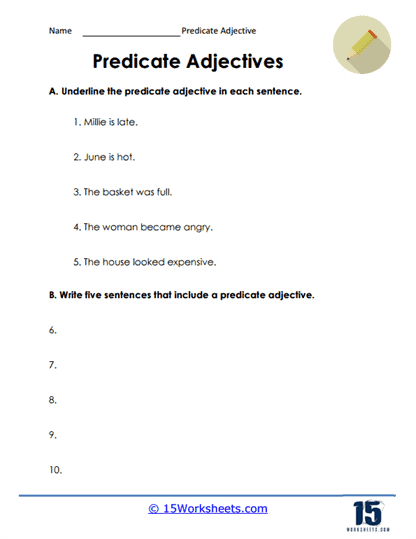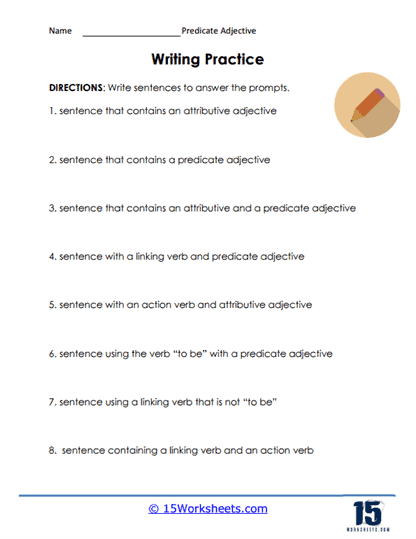Predicate Adjectives Worksheets
All About These 15 Worksheets
These predicate adjectives worksheets are a helpful tool for teaching and reinforcing this grammatical concept. A predicate adjective is an adjective that follows a linking verb and modifies the subject of the sentence.
These worksheets include examples and exercises to help students identify predicate adjectives in sentences and use them correctly. They also include activities such as filling in the blanks with the correct predicate adjective, rewriting sentences to include predicate adjectives, and matching adjectives to their corresponding linking verbs. Through these worksheets, students will:
- Identify predicate adjectives in sentences;
- Understand and dissect the form and function of predicate adjectives;
- Distinguish predicate adjectives from attributive adjectives;
- Transform attributive adjectives in sentences to predicate adjectives and vice versa;
- And write their own sentences that reflect correct usage of predicate adjectives.
By completing these worksheets, students can develop a better understanding of how to use predicate adjectives in their writing and speaking, which is an important skill in effective communication.
What Is A Predicate Adjective?
We use adjectives in sentences to describe a noun or pronoun. An adjective helps make sentences interesting and adds interest to common objects. For instance, nobody will buy or be impressed by a blanket, but a cozy and comfortable blanket provides the right push.
Adjectives fall into two main categories; describing adjectives and limiting adjectives. The predicate and attributive adjective fall into the describing category. Simply put, a predicate adjective is a word that defines or modifies a noun or pronoun. The major difference from other adjectives is that it appears after the subject or noun and pronoun of the sentence, for example, “my uncle was very poor.”
A sentence comprises two parts; a subject and a predicate. The subject is the who or what is doing something, whereas the predicate tells us what the subject is doing. The subject and the predicate are connected through a linking verb in a sentence. Before we move on, let’s see what linking verbs are.
What Are Linking Verbs?
A linking verb connects a verb with a describing word, noun, or pronoun. A linking verb includes all the versions of the “to be” and:
– Becomes
– Grows
– Seems
– Appears
– Sounds
– Keeps
– Remains
Remember, the verb to be and all its forms are true linking verbs, as the words listed above can be used as nouns. If you find any linking verbs before a noun describer, you have identified a linking verb.
Where To Use It In A Sentence
A predicate adjective is usually used at or near the end of the sentence, after a noun, or followed by a linking verb.
For example:
– She is very sick.
– The fabric is pink.
– I am late for work.
The bolded words are predicate adjectives used in different locations throughout the sentences.
Best practices for Predicate Adjectives
When identifying predicate adjectives, the only thing to remember is that they are used with linking verbs. The sentence’s meaning will change if some verbs can or cannot be used as linking verbs.
For instance,
I read slow (incorrect)
I read slowly (correct)
In the above example, read is not a linking verb, and thus we use the adverb “slowly.”
Similarly,
My dog feels soft (correct)
My dog feels softly (incorrect)
Both sentences are grammatically correct in the above example but differ in meaning. Thus, when using linking verbs, first determine what you want your sentence to mean and then choose accordingly.
Examples: Below are some sentence examples using linking verbs and predicate adjectives;
– Barry seems drunk.
– My son is afraid of dogs.
– The weather appears nice.
– Sarah seems tired today.
– I feel dehydrated after the long run.
– My blanket feels soft.
Knowing the right sentence structure and linking verbs to use can improve your writing skills and help you create concise sentences. Many people confuse between adverbs and predicate adjectives. For instance, “I feel badly” is incorrect because it uses an adverb, but “I feel bad” is correct because of the use of predicate adjectives.



